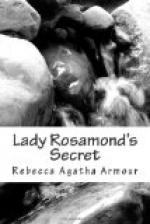It is needless to enter into the details attendant upon Lady Rosamond’s removal from Government House. Sad and tender were the scenes. Mary Douglas could not repress the stifling sobs and outbursts of grief. True to the previous determination, her ladyship had schooled herself for the trying moment. Under the tender care of Sir Howard, the lovely girl took leave of Fredericton, leaving behind those whom she fondly loved. She carried with her many reminiscences of the scenes and trials through which she had passed never to be forgotten throughout her lifetime.
In the meantime a question arose in political affairs which required the mature deliberation of Sir Howard. The boundary dispute was now argued within every district with an earnestness that showed the importance of the cause. The present grievance had grown out of a former one.
In the treaty of 1873, the description of boundary limits between the United States and the Colonies was vague. Owing to a want of proper procedure, England and America merely took their limits from a certain point on the coast, one choosing to the right the other to the left.
The interior boundary was the watershed dividing the sources of the Connecticut and St. Croix rivers from those which emptied into the St. Lawrence. By this the Americans gained all the land bordering their own rivers, while the British had the banks of all the rivers extending to the sea coast. Breach after breach was made, yearly inroads upon British territory were effected, until the free navigation of the St. Lawrence was claimed, leaving the colonies without a frontier.
In the State of Maine, a hostile feeling influenced the entire population. A spirit of fiery independence asserted itself in the face of the British government. Sir Howard kept his eye on the stealthy movements of his disorderly neighbors. He was not to be outwitted by such aggressions; he was determined that neither Colonist nor American should transgress; his rights were to be respected. A New Brunswicker had been prosecuted for attempting to interfere. Equal justice was to be extended to all. The filibusters were not to be pacified; they abused England and her representatives in the most violent and abusive terms. The grievances of Maine must be redressed. Governor Lincoln ordered out the militia to the frontier, while an army of filibusters was ready to take possession of the territory. They thought to work a plan to throw blame upon Sir Howard, in the hope that the English troops might be led to engage in a conflict with the American militia; but the experience of the British representative served him aright, as on former occasions.
Baker, an unprincipled filibuster now resolved to force proceedings, rushed into British ground and tauntingly hoisted the American flag. At this juncture of affairs it was expected that English troops would interfere and a general fight would be the result.




